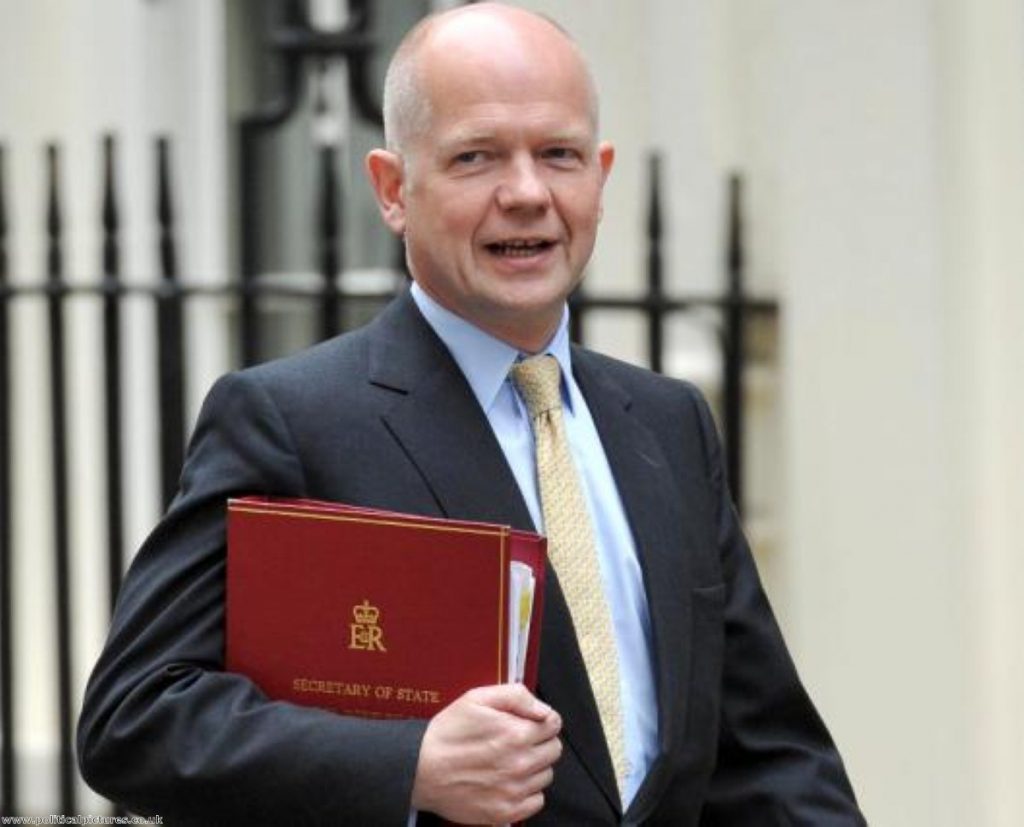Britain pushes ‘difficult’ Syria sanctions
Bringing pressure to bear against Bashar al-Assad could prove “difficult”, William Hague has admitted.
Updating MPs in the Commons on the situation in the Middle East, the foreign secretary said Britain was joining France, Italy and the US in pushing for sanctions against the Syrian government.
“The United Kingdom is working intensively with our international partners to persuade the Syrian authorities to stop the violence and respect basic and universal human rights to freedoms of expression and assembly,” he said.


Mr Hague said Syria faced a “fork in the road” between radical reform which would bring long-term peace and stability and “ever more violent repression, which can only bring short-term security”.
He added: “If it does so we will work with our European partners and others to take measures, including sanctions, that will have an impact on the regime.”
Mirroring the downplaying which preceded the UN security council resolution on Libya, Mr Hague warned that it would be difficult to secure approval for steps against Syria.
“I don’t want to raise expectations of action at the UN security council, that would be unrealistic,” he added.
Mr Hague’s comments followed an earlier statement in which he demanded that “violent repression” in Syria should stop immediately.
He said Britain was “working intensively with our international partners” and that a “strong signal” could be sent by the UN.
Yesterday tanks were used alongside troops in Deraa, a southern city which has proved a key flashpoint for clashes between pro-democracy demonstrators and the government’s security forces.
Shadow foreign secretary Douglas Alexander accused Mr Hague of making decisions in an “ad hoc and apparently uncoordinated manner”.
“This is a fast-moving situation,” Mr Hague replied. “It will change from week to week how we are able to assist them [the rebel forces]… even if that means announcements come at different times and come one after the other.”
On Sunday the Foreign Office changed its travel advice for Syria, strongly advising all British nationals to leave the country while commercial airlines continue to fly.
It was announced earlier today that non-essential American diplomats are being withdrawn from the Middle Eastern country.
“I condemn utterly any violence and killings perpetrated by the Syrian security forces against civilians who are expressing their views in peaceful protests,” Mr Hague said.
“This violent repression must stop. President Assad should order his authorities to show restraint and to respond to the legitimate demands of his people with immediate and genuine reform, not with brutal repression.
“Words are not enough: the emergency law needs to be lifted in practice and the legitimate aspirations of the people met.”
‘No Libya stalemate’
In Libya, the coalition government faced the prospect of a long-term stalemate developing as rebel forces and those supporting Muammar Gaddafi continued to struggle for power.
Mr Hague insisted to MPs that the military situation was not yet completely static, however.
He argued that fighting on the “eastern front”, with Brega, Ajdabiya and Ras Lanuf still disputed by rebel forces and and Muammar Gaddafi loyalists, had not yet degenerated into a standoff.
“Fighting has gone backwards and forwards. It has not yet settled into what one would call a long-term stalemate,” he said.
His comments followed the prime minister’s spokesman admitting that Britain had to “prepare for the long-haul” in implementing UN security council resolution 1973.
Mr Hague said the government’s announcement that it is sending a “small advisory team of British military officers” last week was fully compliant with the UN resolution – and that they were not providing military assistance to rebel forces.
International forces launched an air strike targeted against the dictator’s compound in Tripoli at the weekend.
“If the regime continues to wage war on its people, those who are involved in those command-and-control assets need to recognise that we regard them as legitimate targets,” defence secretary Liam Fox told the Mail newspaper.
“Those who are in command-and-control assets, controlling the regime’s activities against its own people, would have to recognise the risks they would have if they were there during Nato strikes.”
Dr Fox is visiting the US to discuss the situation with his counterpart Robert Gates as Britain and America prepare to step up their military activity.
Saturday saw RAF Tornado and Typhoon jets attack three armoured personnel carriers near Misrata and a surface-to-surface missile facility near the city.
The Ministry of Defence said rocket storage facilities had been destroyed the following day, after eight rocket launcher vehicles were “seriously damaged”.
Yesterday UK aircraft engaged a tank near Mizda and a self-propelled gun near Yafran, as well as a number of missile launchers south-west of Misrata, Major General John Lorimer, strategic communication officer for the chief of the defence staff, said.

